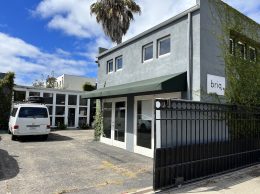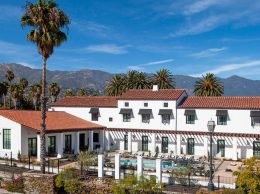Social distancing rules make funeral services challenging
IN THIS ARTICLE
- Health Care & Life Science Topic
- Pat Maio Author
By Pat Maio Friday, June 5th, 2020
Well, at least tears are still permitted at funerals.
The COVID-19 pandemic has led to a patchwork of bureaucratic guidelines by departments of public health in Sacramento and the counties that have made the business of operating a funeral home incredibly complex.
Until late in May, funeral homes were not permitting more than 10 people to attend a funeral indoors, everyone had to wear a mask, and no one could get closer than six feet in order to maintain a safe social distance.
However, strict rules on how many can attend a funeral are beginning to crumble — something that may give the funeral industry a second life.
The Santa Barbara Cemetery has limited burial ceremonies to 10 attendees. No flowers have been permitted and anyone beyond the 10-person crowd size is required to sit in their car. Everyone remains in their cars until the deceased is fully buried, and staff have moved away.
“We ask people to stay a social distance away, and they’re not close to our workers, because they provide an essential function,” said cemetery manager Randy Thwing.
The Carpinteria Public Cemetery has been somewhat lax with the 10-person rule.
“If they have 12 or 14, we make accommodations,” said cemetery manager Michael Damron.
“Really, it’s short-sighted to have a strict approach with families. You don’t need 200 people there, but 15 of the closest should be able to be there and say, ‘Goodbye.’ Funerals are about the living, not the deceased,” he said.
The state began limiting attendance on April 7 as the pandemic flared. But the state’s public health department made a May 25 policy shift that increased the numbers allowed.
If the funeral home held 100 people for a service before the pandemic, they now can let in a quarter — or 25.
But the new guidelines have some funeral directors scratching their heads and complaining about the financial losses.
“We are very confused,” said Douglas Heathcock, manager and funeral director of Paso Robles-based Kuehl Nicolay, owned by Dignity Memorial, a unit of Houston-based Service Corporation International. “You now could be faced with having to make a decision on which 25 will be there at the funeral.”
The pandemic has not hit the Central Coast as hard as other areas of the state. But giving people who did not die from COVID-19 a fitting memorial is equally complex.
Technology to broadcast Zoom meetings at funerals to draw attendance, or online equivalents such as YouTube Live and Facebook Live, have helped ease some of the pain for grieving families during the pandemic.
Jennifer Parks, funeral director with Santa Barbara-based McDermott-Crockett & Associates, said it has come to rely on event-management website Eventbrite to schedule funerals on Zoom to broadcast video compilations made by friends and loved ones expressing condolences and memories.
“One good thing to come out of this is the embrace of technology,” she said. “Without people being here, we use DocuSign (to manage documents electronically), Zoom and Facebook, and open it up for people who couldn’t be here. I do think it will come back to some semblance of normalcy. But it depends on how it all plays out.”
At her funeral home, staff use disinfectant sprays and Clorox wipes to kill germs on railings, the casket, doorknobs and elsewhere, Parks said. Hand sanitizer is laid out everywhere, and masks are distributed at the door as visitors arrive.
“That’s how we do it in Santa Barbara,” she said.
Headaches over how to handle the deceased have some opting for cremations and effectively delaying religious services to a later date.
The trend toward cremations has been rising for several years, due to the cost of burials and other factors. Cremations are expected to make up nearly 67 percent of California’s annual body dispositions in 2020, according to a forecast issued last year by the National Funeral Directors Association. That was before the coronavirus gripped the world.
“It probably has gone up a bit as families are making tougher choices because they can’t have graveside burials,” said Bob Achermann, head of the California Funeral Directors Association, a trade group representing more than 600 members.
Jeanne Clark, manager and director of the Ventura-based Ivy Memorial Park and Funeral Home, said that special services have largely been eliminated.
In someone’s death, “Closure is almost impossible to get, and it is what you strive to give people,” Clark said. “People sit in cars with windows closed, next to a grave 100 feet away. That’s how they are grieving.”
• Contact Pat Maio at [email protected].












